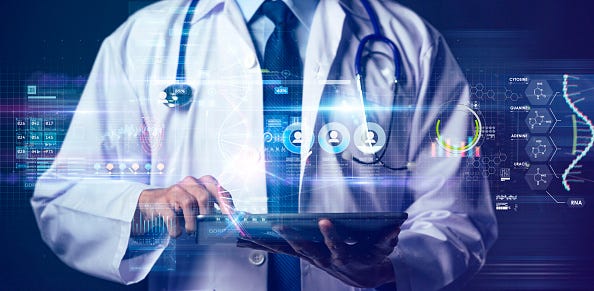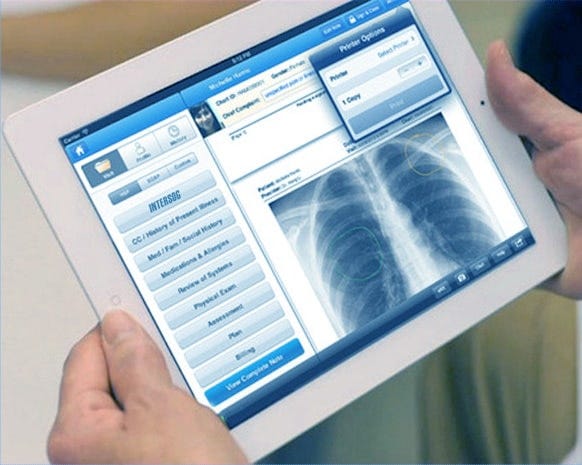The Role Of Technology In Improving Africa’s Healthcare System –
The Role Of Technology In Improving Africa’s Healthcare System

Africa has the world’s least developed health system. — It is underfunded, understaffed, and overstretched.
The first thing to note is that Africa is a diverse continent with diverse governance structures, especially in the Francophone and Anglophone countries, whose governance reflects their colonial masters’.
Nevertheless, almost all African countries share similar thematic issues, particularly those of Sub-Saharan Africa.
In a paper submitted to the observer research foundation (ORF), the authors (Mwai, Daniel, and Theresa Ndavi) narrowed down these challenges to five main issues:
- Leadership and governance challenges
Across legislation, community participation, resource allocation, and application of national health research protocols, there is a lack of adequate leadership.
- A shortage of healthcare workers
Specifically trained health workers and health workers, in general, are in short supply. 2030 is projected to mark the peak of this shortage at 6.1 million.
Throughout many areas of life, corruption undermines supply chains, causes a waste of resources, causes unaffordability, and delays in service delivery.
- A dearth of information and communications technology
Even though significant advances have been made with respect to the use of ICT in a variety of health sectors, this is not sufficient to lead to meaningful changes.
Africa has a difficult time raising sufficient tax revenue to invest in healthcare and ensure that it is supported effectively and efficiently. Over-reliance on foreign funding is also prevalent.
What Technology Has To Offer

Technology in healthcare is not a new thing. In every medical scenario, from the most severe to the simplest, like a broken bone, medical technology is used. Technology advancement is constant and undeniable, from plasters to robotic surgery.
Over the years, technology has improved patient diagnosis and treatment. Healthcare is probably the most important sector that benefits from technology adoption. As a result, it has improved the quality of life over time and saved many lives.
Technology has made many breakthroughs in healthcare over the last few years:
- Health Information Technology: Electronic Health Records (EHR)

The use of manual systems (paper-based) is still dominant in many African countries. Unfortunately, this comes with its own set of challenges. As an example, the 2014 Ebola outbreak in West Africa was prolonged in part due to insufficient communication of accurate and timely information.
Electronic Health Records (EHR) allow health practitioners to store and retrieve patient health records. Using a legible format that can be accessed by anyone, improves the communication of patient information.
This reduces the probability of medication errors. In addition, it will be easier to retrieve patient information through a database without having to perform new health checks.
Medical technology contributes to patient safety. To start with, there are medication alerts, flags and reminders, consultations and diagnosis reports, and an easier way to access patient information. The alerts can be particularly helpful for adhering to specific treatments and treatment schedules.
Also, an electronic record of data can help bring uniformity to healthcare practitioners’ practices. Furthermore, evidence from past studies suggests that an electronic health record improves care for common conditions.
In the past, the cost of digitizing health records used to be a barrier. But with advancements in cloud computing and telecommunications technology, digitizing health records is becoming easier and cheaper. Ilerah’s cloud-based EHR solution allows patients’ information to be captured, stored, and accessed in real time.

Telehealth systems can be beneficial for the treatment of non-critical illnesses. It also has the advantage of taking advantage of medical personnel who have migrated abroad but still hold valid licenses to practice in their home country. This can help reduce the pressure on physicians and also reduce the cost of care.
Companies like Sasa doctors. in Kenya and Lafiya in Nigeria provide telemedicine services to enable patients to get consultations with a pre-screened medical professional via a smartphone app provided they have an internet connection.
According to the GSMA mobile economy report series, by 2025, 84% of the African population will have access to a SIM connection. This represents enormous opportunities for healthcare innovation around the smartphone.

They began as a fitness tracker to track heart rate and pace, and they highlighted healthcare potential. Health wearables can detect cardiovascular anomalies earlier and prevent severe conditions.
It is common in most African countries to pay before receiving services. For sub-Saharan African families without sound financial foundations, out-of-pocket payments are commonly between 60% and 70%, compared to 46% for the world at large.
A model like this doesn’t guarantee a high service level, especially when doctors and medical personnel are overworked.
The case is a little different for insured payment as HMOs and Health insurance companies pay all or part of the fees after the service. With less than 30% insured, a large percentage of healthcare transactions are settled by patients.
A payment system that can integrate with other applications can reduce the processing time at the point of care as well as reduce costs.
With Ilerah’s EHR, medical practices can improve their revenue cycles through its fully integrated payment system.
Read also: medical and diagnostics centre business plan in Nigeria
- Standardized communication
The verification of eligibility and benefits, claims management, and authorization of claims consumes considerable time and energy at medical facilities. The automation of these processes can be achieved by using a well-defined communication standard across Africa.
The United States has implemented standards such as EDI 270/271 and EDI 837/835 to automate eligibility verification and claim submission.
Companies like Availity have created platforms for transferring data between insurance companies, healthcare facilities, and third parties.
A similar framework will significantly speed up healthcare delivery in Africa and, as a result, reduce patient costs.
Artificial intelligence could be used in Africa’s healthcare to improve various aspects, according to Laura Sallstrom and Olive Morris.
Among these are reducing healthcare expenditures, early disease detection, and monitoring, improving personalized medicine, and limiting healthcare professionals’ exposure to contagious infections.
One initiative using AI is the Nigerian company dokilink, which allows doctors to exchange medical cases with colleagues. Patients, meanwhile, have access to over 11,000 pre-screen medical professionals to book appointments with.
Ubenwa is another Nigerian company using artificial intelligence to detect birth asphyxia. The system detects asphyxia-related anomalies by analyzing a baby’s cry.
Conclusion
African health problems are deeply entrenched and require more than resources to transform into a dependable health system, as is the norm in the first world.
Technology offers the most significant leverage to change the healthcare landscape in Africa. The adoption of artificial intelligence, data systems, telehealth, and a standard communication system makes it easy for all stakeholders to collaborate and address systemic issues.
If Africa is looking for a brighter future, the application of technology should be the first port of entry and our product roadmap show how we are working to make an impact on Africa’s healthcare landscape
